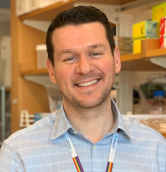
Joseph P. Zackular, PhD
Assistant Professor of Pathology and Laboratory Medicine
Assistant Professor of Microbiology
Perelman School of Medicine at the University of Pennsylvania
Contact InformationChildren's Hospital of Philadelphia
Department of Pathology and Laboratory Medicine
Abramson Pediatric Research Center, Rm. 1211A
3615 Civic Center Blvd
Philadelphia, PA, 19104
Tel: 267-426-5016
Email: zackular@upenn.edu
Specialty Division
Cancer and Immunobiology, CHOP Experimental Pathology
Research Expertise
The Zackular laboratory is focused on understanding how interactions between the host, gut microbiota, and pathogens impact human health and disease. The labs efforts primarily center on the nosocomial pathogen, Clostridioides difficile, which is an urgent global public health threat. The Zackular lab is interested in understanding how the gut microbiota shapes C. difficile fitness and virulence, and the team is studying how this complex microbial community alters host responses to infection. Recent work from the Zackular lab has focused on elucidating cooperative interactions between C. difficile and other pathogens, such as the enterococci. Leveraging knowledge learned from studying polymicrobial interactions and microbial ecology during infection, the Zackular lab is also developing novel vaccine strategies for the prevention of C. difficile infection and using microbiome-based therapies for the treatment of disease.
Dr. Zackular is co-director of the Center for Microbial Medicine at the Children’s Hospital of Philadelphia, which focuses on i.) bringing microbiome-based medicine to pediatric patients and ii.) using whole genome sequencing of pathogens to provide children with improved and personalized treatments for infections.
Keywords: Clostridioides difficile; Enterococcus; Gut microbiome; Microbial Ecology; Host-pathogen interactions; Pathogen-microbiota interactions; Inflammatory Bowel Disease; Vaccine development
Graduate Groups
Cell and Molecular Biology
Immunology
Education
BS (Microbiology), University of Massachusetts - Amherst, 2008
MS (Microbiology), University of Massachusetts - Amherst, 2009
PhD (Microbiology & Immunology), University of Michigan, 2014
Specialty Certification
Postgraduate Training
Postdoctoral Research Fellow, Vanderbilt University Medical Center, 2014-18
Awards and Honors
F32 Ruth L. Kirschstein National Research Service Award Individual, Postdoctoral Fellowship (NIH/NIAID), 2015
Ward J. MacNeal Educational and Scientific Memorial Trust Distinguished Dissertation Award, Department of Microbiology & Immunology, University of Michigan, 2015
Sidney P. Colowick Award for Outstanding Postdoctoral Research, Department of Pathology, Microbiology and Immunology, Vanderbilt University Medical Center, 2017
K22 Career Transition Award (NIH/NIAID), 2019
NIH Loan Repayment Program Award (NIH/NIAID), 2019
2020 Award for Excellence in Mentoring Research Trainees, Children's Hospital of Philadelphia, 2020
Klaus Hummeler High-Impact Publication Award, Children’s Hospital of Philadelphia, 2023
Heritage Lectureship, Department of Microbiology, University of Michigan, 2024
Memberships and Professional Organizations
Web Links
Selected Publications
Liberation of host heme by Clostridioides difficile-mediated damage enhances Enterococcus faecalis fitness during infection
Smith AB, Specker JT, Hewlett KK, Scoggins TR 4th, Knight M, Lustig AM, Li Y, Evans KM, Guo Y, She Q, Christopher MW, Garrett TJ, Moustafa AM, Van Tyne D, Prentice BM, Zackular JP. mBio 15(1):e0165623, Jan 2024. doi: 10.1128/mbio.01656-23. Epub 2023 Dec 11. PMID: 38078767; PMCID: PMC10790701
Nonsteroidal anti-inflammatory drugs sensitize epithelial cells to Clostridioides difficile toxin-mediated mitochondrial damage
Soto Ocaña J, Bayard NU, Hart JL, Thomas AK, Furth EE, Lacy DB, Aronoff DM, Zackular JP. Sci Adv 9(29):eadh5552, Jul 2023. doi: 10.1126/sciadv.adh5552. Epub 2023 Jul 19. PMID: 37467340; PMCID: PMC10355836.
Investigation of Microbial Cooperation via Imaging Mass Spectrometry Analysis of Bacterial Colonies Grown on Agar and in Tissue During Infection
Specker JT, Smith AB, Keenan O, Zackular JP, Prentice BM. J Vis Exp (189), Nov 2022. doi: 10.3791/64200. PMID: 36468707.
Enterococci enhance Clostridioides difficile pathogenesis
Smith AB, Jenior ML, Keenan O, Hart JL, Specker J, Abbas A, Rangel PC, Di C, Green J, Bustin KA, Gaddy JA, Nicholson MR, Laut C, Kelly BJ, Matthews ML, Evans DR, Van Tyne D, Furth EE, Papin JA, Bushman FD, Erlichman J, Baldassano RN, Silverman MA, Dunny GM, Prentice BM, Skaar EP, Zackular JP. Nature 611(7937):780-786, Nov 2022. doi: 10.1038/s41586-022-05438-x. Epub 2022 Nov 16. PMID: 36385534; PMCID: PMC9691601.
Multi-omic Analysis of the Interaction between Clostridioides difficile Infection and Pediatric Inflammatory Bowel Disease
Bushman FD, Conrad M, Ren Y, Zhao C, Gu C, Petucci C, Kim MS, Abbas A, Downes KJ, Devas N, Mattei LM, Breton J, Kelsen J, Marakos S, Galgano A, Kachelries K, Erlichman J, Hart JL, Moraskie M, Kim D, Zhang H, Hofstaedter CE, Wu GD, Lewis JD, Zackular JP, Li H, Bittinger K, Baldassano R. Cell Host Microbe 28(3):422-433.e7, Sep 2020. doi: 10.1016/j.chom.2020.07.020. Epub 2020 Aug 20. PMID: 32822584; PMCID: PMC9332131.
From Nursery to Nursing House: Emerging Concepts in Clostridioides difficile Pathogenesis
Smith AB, Soto Ocana J, Zackular JP. Infect Immun 88(7):e00934-19, Jun 2020. doi: 10.1128/IAI.00934-19. PMID: 32122939; PMCID: PMC7309631.
Microbe-microbe Interactions During Clostridioides difficile Infection
Abbas A, Zackular JP. Curr Opin Microbiol 53:19-25, Feb 2020. doi: 10.1016/j.mib.2020.01.016. Epub 2020 Feb 20. PMID: 32088581; PMCID: PMC7244385.
Misoprostol protects mice against severe Clostridium difficile infection and promotes recovery of the gut microbiota after antibiotic perturbation
Zackular JP, Kirk L, Trindade BC, Skaar EP, Aronoff DM. Anaerobe 58:89-94, Aug 2019. doi: 10.1016/j.anaerobe.2019.06.006. Epub 2019 Jun 17. PMID: 31220605; PMCID: PMC6697607.
Nonsteroidal anti-inflammatory drugs alter the microbiota and exacerbate Clostridium difficile colitis while dysregulating the inflammatory response
Maseda D*, Zackular JP*, Trindade B, Kirk L, Roxas JL, Rogers LM, Washington MK, Du L, Koyama T, Viswanathan VK, Vedantam G, Schloss PD, Crofford LJ, Skaar EP, Aronoff DM. mBio 10(1):e02282-18, Jan 2019. doi: 10.1128/mBio.02282-18. PMID: 30622186; PMCID: PMC6325247.
Dietary Zinc Alters the Microbiota and Decreases Resistance to Clostridium Difficile Infection
Zackular JP, Moore JL, Jordan AT, Juttukonda LJ, Noto MJ, Nicholson MR, Crews JD, Semler MW, Zhang Y, Ware LB, Washington MK, Chazin WJ, Caprioli RM, Skaar EP. Nat Med 22(11):1330-1334, Nov 2016. doi: 10.1038/nm.4174. Epub 2016 Sep 26. Erratum in: Nat Med. 2016 Dec 6;22(12 ):1502. PMID: 27668938; PMCID: PMC5101143.


